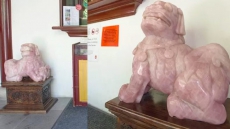HALIFAX — When heaving waters in the North Atlantic wrenched a string of massive steel pipes from a drilling ship off Nova Scotia's coast, one of the 20-tonne sections of the plummeting coil struck the seabed just 12 metres from the top of an undersea oil exploration well.
The distance is one of several details in a Shell Canada accident report received through access to information legislation, prompting critics to say the entire incident was too close for comfort in an area near one of Atlantic Canada's richest fishing grounds of the Scotian shelf.
A summary report by the regulator issued earlier this year had said a heavier portion of the drilling system fell 22 metres from the wellhead, but didn't mention the closer distance of pipes that are coiled and criss crossed through an area of seabed the size of three football fields in length and breadth.
The Shell project, about 250 kilometres off Nova Scotia, is the first of two offshore wells to be drilled in almost a decade, and the company recently announced it has moved off the well where the accident occurred and shifted exploration to a deep-water well about 120 kilometres away.
"It's much too close to a worst-case scenario happening," said Mark Butler, a critic of the project and director of the Ecology Action Centre in Halifax of the accident. "We're not happy about them drilling in those depths."
Shell spokesman Cameron Yost says "multiple, independent barriers" on the wellhead would have "provided assurance that the well would have remained secure," if a pipe had landed on the blowout preventer and well.
He also says the blowout preventer that sits on the well had systems to keep the well closed, and "these two separate systems provide redundancy in our safety systems."
Still, the Shell Canada report into the accident of March 5 describes a harsh operating environment for the Stena IceMax drill ship in the winter months leading up to the day of the costly loss.
The report says on 10 prior occasions weather reports called for seas that would heave up to three storeys high or for gales to deliver dangerous wind levels —prompting the ship to remove the drilling fluids from pipes and replace the potential pollutants with seawater.
On Feb. 6 through Feb. 10, a winter storm moved through the area 250 kilometres offshore, sending seas heaving "between eight metres and 8.9 metres in 30 minutes" as the ship remained attached to the well.
The document says on March 5, weather forecasts again called for heaves beyond the eight metre operating limits of the drilling ship, and the ship again prepared to move off the site.
It decided to stay put when weather wasn't as rough as predicted.
Then, a massive 9.25 metre high heave was registered, prompting the decision to unlatch from the well, says the report.
The operators decided to retract six "tensioners" — which resemble giant shock absorbers that move with the heaving drilling pipes — in the area of the ship where the pipes are attached.
This was to create added space between the top of the well at the bottom of the ocean and the drilling pipe system.
At 3:15 p.m., the ship started towing the pipe, but with the absorption system retracted and a special recoil system reset, the pipe system rose up above a metal ring holding it and then slammed down.
Within minutes the ring split open, allowing the pipes to plummet to the sea floor.
The Shell report places the primary blame for the accident on the unclear manuals and an error in deciding to leave the absorption system in its rigid and compacted position.
However, the report doesn't comment on what would have happened if pipes weighing the equivalent of roughly 20 elephants on land had struck the wellhead.
Asked why the detail was omitted from the public summary, a spokeswoman for the Canada-Nova Scotia Offshore Petroleum Board says the report was for "general public consumption prior to the board allowing the resumption of drilling."
"We do not speculate on events that have not taken place," wrote Kathleen Funke, the spokeswoman for the regulator, adding that companies are required to have a dual barrier in place between the well and the sea at all times.
The final and preliminary Shell accident reports raise issues about "on-the-job" training of senior staff who oversee the delicate operation of unhooking several kilometres of pipe along with a 144-tonne portion of the drilling system from the well when seas are rough.
One sentence in a preliminary version of the report, which didn't make it into the final draft, says unlatching in rough seas is an operation with a high level of risk and is "an activity where the senior crew's combined level of competencies ... was relatively low and where the available procedures did not address the risk..."
Both reports say three senior staff involved had experience with unlatching, but the driller, a subsea engineer and a toolpusher in the area overseeing the operation — who could have offered specialized advice — did not have the relevant experience on the systems in use.
Shell and the CNSOPB both say the training deficits have been corrected, and the procedures clarified and amended to avoid a similar problem.
However, John Davis of the Clean Ocean Action Committee — a coalition of environmental and fishing groups opposing the deepwater exploration — said the incident and the harsh conditions bring up questions on why the regulator is allowing the use of a drillship for exploration in an area where ocean conditions have repeatedly exceeded the operating limits.
He said fishermen in his group have long noted that the sloping nature of the Scotian shelf tends to create occasional, highly amplified heaves that can pose dangers.
"They (Shell) should have used a semi-submersible rig," he said, referring to a different form of drilling apparatus.
"They lost control of their well site based on standard environmental conditions on the edge of the Scotian shelf."
Dena Murphy, a safety manager with the regulator, said both drill ships and semi-submersible rigs have operated safely off the East Coast. "With appropriate preparations in place, weather conditions can be properly managed ... on both types of units," she wrote in an email.




